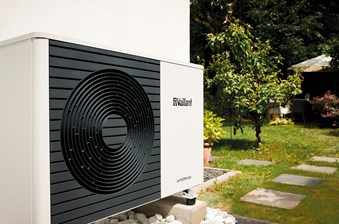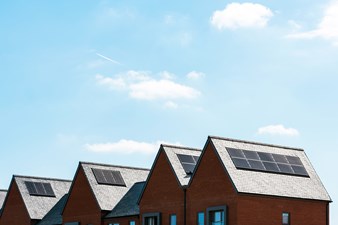Some of the best renewable heating solutions
14 June 2023
Here at Swale Heating, we are committed to protecting the planet with our range of sustainable and renewable energy options.
We provide the latest technology in renewable and sustainable heating and hot water solutions for your home, which makes going green as simple as possible.
With such a large range of renewable heating solutions on the market, it can be hard to know which one is best suited to your home. In this blog, we are going to tell you about the renewable heating solutions we offer and the benefits they can bring to your home.
Heat pumps
There are three types of heat pumps on the market: air-source heat pumps, ground source heat pumps and water source heat pumps. They work in different ways and are compatible with different types of heating systems.
Air-source heat pumps are fast becoming a popular choice for homeowners who are looking for renewable heating solutions. Air source heat pumps are one of the most economical and eco-friendly solutions available.

An air-source heat pump utilises heat from the outside air and converts it into heat which can be used with a standard heating and hot water system
What are the benefits of an air source heat pump?
- Minimal maintenance required- Lower carbon emissions
- Likely to reduce your fuel bills
- No solid fuel deliveries are needed
- Can heat your home as well as your water
If you’re thinking of installing an air source heat pump, there are a few things to consider:
- The unit will need to be fitted to a wall or placed on the ground outside your home. It will require plenty of space so air can flow around it.
- Your home needs to be well insulated and draught-proofed to minimise heat loss. Air source heat pumps work best when producing heat at a lower temperature.
For more information on air-source heat pumps, click here.
Solar panels
The term ‘solar panel’ is often used interchangeably to describe the panels that generate electricity and those that generate hot water.
Solar PV panels
Solar PV panels capture the sun’s energy and convert it into electricity. They produce their energy from daylight rather than solar radiation, meaning they still work on cloudy days.
Solar PV panels have many benefits including:
- Solar energy is a low carbon, renewable energy. Using solar energy reduces the dependency on large–scale commercial electricity providers.
- Sunlight is free, so once you’ve paid for the initial installation, your electricity cost will be reduced.
- Solar PV panels are very reliable. They have a lifespan of around 40-50 years.
- Solar energy systems generally don’t require a lot of maintenance. You only need to keep them relatively clean.

You can find out how much you could save by using the Solar Energy Calculator.
For more information on solar PV panels click here.
Solar thermal panels
Solar thermal panels harness the power in both direct and indirect sunlight to convert energy into heat and hot water for the home. Solar thermal panels are designed to work alongside your existing heating systems and use a hot water cylinder to store the hot water generated.
The benefits of solar thermal panels are:
- Reduced energy bills - Once you have paid for the initial installation, your hot water costs will be reduced as sunlight is free. The system will work all through the year, even when it’s cloudy. Although, you will need to heat the water further with a boiler or immersion heater during the winter months.
- Lower carbon footprint - Solar hot water is a green, renewable heating system and can reduce your CO2 emissions.
If you are considering installing solar thermal panels, there are a few things you need to consider:
- You may need planning permission to fit solar thermal panels to your roof.
- Solar thermal panels require around five square metres of roof space that receives direct sunlight for most of the day.
- You will require a dedicated cylinder with a solar heating coil.
- Will your boiler work with solar thermal panels? If your boiler is a combination boiler (combi) and you don't currently have a hot water tank, a solar hot water system may not be compatible.
For more information on solar thermal panels click here.
If you’d like some more information on the renewable options and the services we provide, please contact us here or call our expert Sales Team on 0800 731 33 44.
